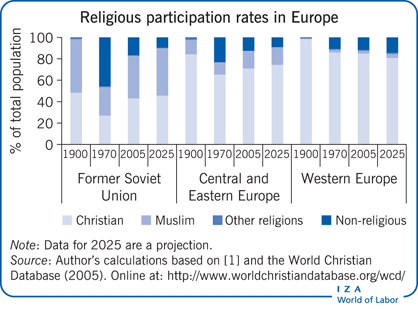Elevator pitch
Most religions in transition economies were marginalized by their former communist regimes. Today, some of these countries are experiencing a revival of religiosity, while others are prone to secularization. Religious norms affect individual decision making with respect to human capital investment, economic reforms, marital stability, employment, and other contexts. This implies that the interests of both religious and non-religious communities may differ and must be taken into account when designing and implementing economic policies, which is a challenge for policymakers.
Key findings
Pros
Patterns of religiosity are distinct within transition countries; some experience a revival, while others are prone to secularization.
Religiosity may increase the quality of human capital by improving educational outcomes, motivating health-related behavior, and enhancing individual life satisfaction.
Individual religiosity may reduce adverse psychological effects of layoff, hardship, and economic reforms.
Surveys provide rich information about religious beliefs, activities, and affiliations, which can be used for policy analysis and design.
Cons
Declarative religious affiliation and strong religious commitment may affect economic outcomes differently, but existing studies rarely distinguish between these measures of religiosity.
Most studies on religiosity and individual economic outcomes and behavior provide correlational, not causal evidence.
Research on the social and economic impact of particular religious denominations is missing.
Potential negative effects of religiosity stemming from extreme and conservative religious beliefs are understudied.
